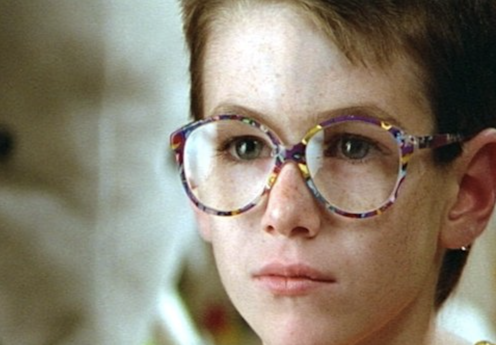this beautiful Aussie film was one of the most important HIV/AIDS documentaries ever produced
- Written by Jessica Gildersleeve, Professor of English Literature, University of Southern Queensland

Since 1988, World AIDS Day[1] has been held each year on December 1. This World AIDS Day, we’re reflecting on one of the most important HIV/AIDS documentaries ever produced: A Kid Called Troy[2], released in Australia 30 years ago.
The film tells the story of Troy Lovegrove, a seven-year-old Australian boy who became HIV-infected during birth, and the support and advocacy of his father, Vince Lovegrove. The story of Troy’s mother, Suzi Lovegrove, and her experience with HIV/AIDS had been documented in 1987’s Suzi’s Story[3], released the same year Suzi died.
The two films mark a significant moment in the cinematic history of health communication. Their agenda – unquestionably progressive for the time – was to document the family’s struggle against systemic injustice and social discrimination, and to centre attention on their story, told in their own words, with authority and agency.
The documentaries promote support and understanding in the place of rampant victimisation, erasure and neglect, just as the Lovegroves had achieved within their own community.
‘Triumphant testimony’
The made-for-television documentary tells Troy’s story through direct-to-camera interviews with Troy, Vince and others in their circle.
The crew, under director Terry Carlyon, were careful to build close bonds with the family prior to introducing any filming equipment. This ease and honesty is evident in the way Troy and Vince open up to the camera and thus directly to the viewer, sharing private thoughts on their experiences.
While the film is focused on Troy as a child with HIV, the emphasis is placed – perhaps for the first time – on living with HIV, rather than dying from it. We see Troy’s ordinary life at home with his father and sister, attending school, gymnastics and doctor’s appointments.
The Age praised the film’s “deeply moving and inspiring” content, “gigantic courage” and “blushingly intimate portrait of private joy and torment”. The ratings report for the week called for the ABC to “repeat this triumphant testimony to the human spirit – and soon”.
Read more: Ending HIV in children is way off target: where to focus action now[4]
‘A minority within a minority’
The films are a testament to the human spirit. But they are also important works of activism, advocacy and education.
In A Kid Called Troy, a local woman from a rural community in Arnhem Land, which Troy and Vince regularly visited as part of their outreach work, observes “AIDS doesn’t discriminate”.
Suzi became infected with HIV after a “casual affair” with a man in New York. Not yet aware of this, she passed the virus on to Troy at birth.
These films widened the common cultural understanding of who might be affected by HIV/AIDS. They made clear that, without preventive education and awareness-raising of how the virus works, suffering and stigma will continue.
By focusing on the experiences of an ordinary mother and her child, the films gave viewers an experience they could recognise, rather than insisting on the fundamental “difference” of people living with HIV.
As Vince said[5]:
Suzi wanted to get into people’s minds and souls and make them aware of what AIDS-fear was doing to our community. She wanted to let people know what life had been like as a minority within a minority.
AIDS prevention and education
The year Suzi’s Story was released so was the infamous Grim Reaper campaign[6].
Although the advertisement was part of a wider policy[7] more transparent and innovative than those that had come before, the campaign relied on fearmongering as a primary strategy.
The commercial, part of a A$3 million national educational campaign, did not specify how HIV/AIDS could be contracted or transmitted, or the prevention and support strategies available. This fuelled a moral panic[8] that targeted gay men, in particular those living with HIV and those who injected drugs.
The stigma associated with HIV made the programming of prevention education difficult. In 1987, Ted Coleman’s story in Living with Aids[9] aired on WBZ-TV in Boston without commercials because the television station was unable to find a sponsor.
‘A beautiful brief flash’
A Kid Called Troy stands apart from other HIV/AIDS films of the time because it was concerned with quality of life rather than the spectre of death. It brought Troy’s life into mainstream attention through the accessibility and domesticity of a family-centred television documentary.
It was a landmark moment in the popular depiction of HIV/AIDS.
Troy’s life, in his sister Holly’s words, was “a beautiful brief flash”. He died at the age of seven, just three months before the film was aired.
In his film, Troy’s relentless optimism and zest for life, combined with his father’s unswerving determination, leaves us with the promise of hope, and even the audacity to laugh. In one scene, Troy asks his father, “My video’s going to win more awards than mummy’s, isn’t it dad?”
He seemed to understand his legacy was the very act of understanding itself – comprehension rather than apprehension, compassion above all else.
Read more: Ending HIV as a public health threat – 3 essential reads[10]
References
- ^ World AIDS Day (www.worldaidsday.org.au)
- ^ A Kid Called Troy (www.screenaustralia.gov.au)
- ^ Suzi’s Story (www.youtube.com)
- ^ Ending HIV in children is way off target: where to focus action now (theconversation.com)
- ^ Vince said (catalogue.nla.gov.au)
- ^ Grim Reaper campaign (www.youtube.com)
- ^ wider policy (www.screenaustralia.gov.au)
- ^ moral panic (www.bandt.com.au)
- ^ Living with Aids (nakedeyeproductions.com)
- ^ Ending HIV as a public health threat – 3 essential reads (theconversation.com)

















